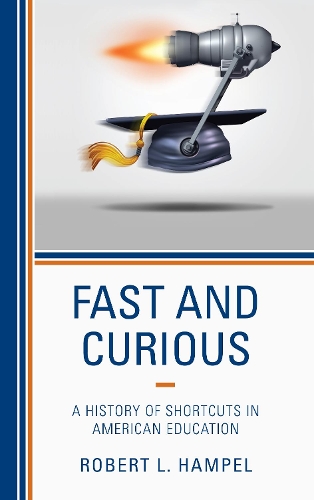
Fast and Curious: A History of Shortcuts in American Education
(Paperback)
Available Formats
Publishing Details
Fast and Curious: A History of Shortcuts in American Education
By (Author) Robert L. Hampel
Bloomsbury Publishing PLC
Rowman & Littlefield Publishers
15th December 2017
United States
Classifications
Professional and Scholarly
Non Fiction
370.973
Physical Properties
Paperback
192
Width 151mm, Height 229mm, Spine 15mm
290g
Description
This book examines four types of shortcuts in the history of American educationstreamlined paths to vocational success, cultural sophistication, college credentials, and the efficient use of English. The chapters profile Norman Rockwell, the Harvard Classics, Cliff Notes, speed reading, a Doctor of Arts diploma for college teachers, and other riveting examples of time-savers that attracted millions of ambitious Americans since the late 19th century.
Reviews
Learning is hard. Some people will tell you otherwise, but they are either lying or delusional. Reading this book, however, is a pleasure. You should do so. * History of Education Quarterly *
Americans are big believers in the power of education. But they are also a national of hustlers, intent on reaping the rewards of education with minimal expenditure of time and effort. In a series of absorbing and often astonishing case studies, Bob Hampel shows us how the free market responded to popular demand. -- Jack Schneider, College of the Holy Cross
Bob Hampel tours a vast range of techniques and institutions that have promised to make learning faster and easier (Part One) or faster and harder (Part Two). He describes how to earn a college degree without attending one, excel on a Shakespeare exam without reading a play, write a prize-winning novel, read 40 books a week, finish college in three years, and make everyone like you. Hampels remarkably insightful study shows how this apparent underside of education often merged into the academic mainstream and drew on avant garde ideas. Collectively, shortcuts speak volumes about democracy in American education. -- Joseph Kett, University of Virginia
Devised by well-intended educators, entrepreneurs, and scoundrels, programs like the Famous Artists School, university based correspondence schools, The Great Books of the Western World, paint-by-numbers kits, Cliff Notes, shorthand, and speedreading have promised make learning faster and/or easier. Hampels highly original and often entertaining account captures the fascinating history of our perennial quest for shortcuts. I could not put it down! -- Jackie Blount, Ohio State University
Hampel takes no shortcuts in his superb history of the fast track. Beautifully written, richly researched, and wryly observed, this book provides vivid examples of the marketplace for fast, fun, easy, cheap and useful credentials. Many have fallen to temptation: university administrators and lazy undergraduates, successful artists and hacks, quacks, and hucksters. Every American should read this delightful and important book. -- Benjamin Justice, Rutgers University
Author Bio
Robert L. Hampel is a professor of education at the University of Delaware. From 2002 to 2011 he was the Secretary/Treasurer of the History of Education Society.
